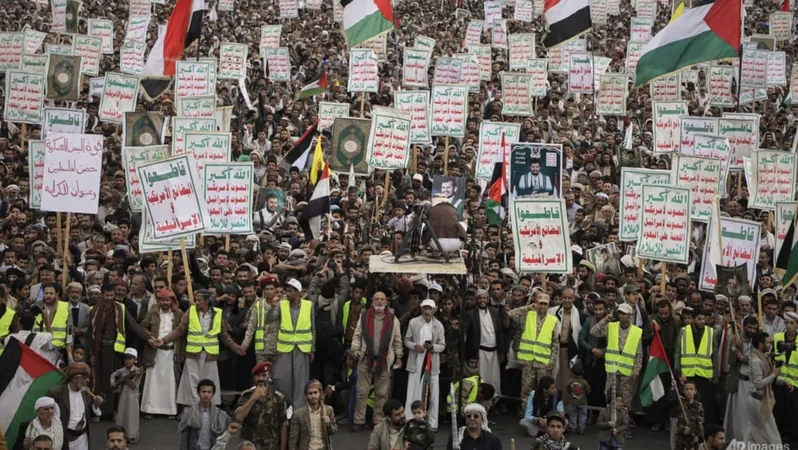
Trump Issues Stark Warning to Iran Amid Escalating Houthi Attacks
2025-03-17
Author: Nur
In a bold declaration on March 17, 2023, U.S. President Donald Trump stated that Iran would be held accountable for any assaults carried out by the Houthi group in Yemen, a militant faction that has been receiving support from Tehran. This announcement coincided with a significant escalation of U.S. military operations in the Middle East, marking the largest campaign since Trump resumed his presidency.
The U.S. response came after the Houthis threatened international shipping routes, prompting the Pentagon to initiate a new wave of airstrikes targeting locations in Yemen, particularly around the Red Sea port city of Hodeidah and the Al Jawf governorate near the capital, Sanaa. According to reports from Houthi-aligned Al Masirah TV, over 30 sites had been struck, leading to substantial casualties among Houthi ranks.
Trump emphasized in a statement on his Truth Social platform: "Every shot fired by the Houthis will be regarded as a shot fired from the weapons and leadership of IRAN, and IRAN will be held responsible, and suffer the consequences, which will be dire!" This statement underscores the administration's tough stance on Iran, as the White House reiterated that Trump's message was clear: the U.S. must be taken seriously.
Tragically, the Houthi ministry has reported significant civilian casualties, claiming at least 53 deaths, including five children and two women, from the recent airstrikes. These numbers have not been independently verified.
The Houthis have aggressively disrupted global trade by launching numerous attacks on vessels in the Red Sea since late 2023, leveraging the geopolitical tensions stemming from the Israeli-Palestinian conflict. They assert that their actions are a show of solidarity with the Palestinians amid ongoing hostilities. However, the U.S. and its allies condemn these attacks as reckless invasions that jeopardize international commerce.
Further complicating matters, the militant group has declared it will target U.S. vessels in the Red Sea in retaliation for ongoing U.S. military actions in Yemen. Houthi leader Abdul Malik al-Houthi has positioned the group as an ally in the broader "Axis of Resistance," which opposes U.S. interests and Israeli actions in the region, thereby aligning the Houthis with factions like Hezbollah and Hamas.
Increased military measures have raised concerns about a potential protracted conflict. Officials suggest that airstrikes could continue for weeks, with Washington intensifying its sanctions on Iran.
On the diplomatic front, an Emirati official recently conveyed a letter from Trump proposing new nuclear talks with Tehran, a proposal that was immediately dismissed by Iranian Supreme Leader Ayatollah Ali Khamenei as a "deception." Iranian officials have responded cautiously, promising a thorough examination of the letter before formulating a response.
Experts believe that while Iran supports the Houthis, the group has its own agenda and is primarily focused on domestic issues rather than merely acting as Tehran's proxy. The Houthis have also claimed to have launched further attacks against U.S. military assets, including the aircraft carrier USS Harry S. Truman.
Meanwhile, the ongoing conflict has ramifications for the fragile ceasefire agreements in the region. Violent exchanges continue, with reports of an Israeli airstrike in Gaza killing three Palestinians, heightening tensions against the backdrop of strained negotiations facilitated by regional powers such as Qatar and Egypt.
As both sides resume military operations, the world watches anxiously, concerned about the potential for broader regional instability amidst the fragile balance of power in the Middle East. The latest developments indicate that both the Houthis and Israel are doubling down on their positions, making immediate diplomatic resolutions seem increasingly difficult.

 Brasil (PT)
Brasil (PT)
 Canada (EN)
Canada (EN)
 Chile (ES)
Chile (ES)
 Česko (CS)
Česko (CS)
 대한민국 (KO)
대한민국 (KO)
 España (ES)
España (ES)
 France (FR)
France (FR)
 Hong Kong (EN)
Hong Kong (EN)
 Italia (IT)
Italia (IT)
 日本 (JA)
日本 (JA)
 Magyarország (HU)
Magyarország (HU)
 Norge (NO)
Norge (NO)
 Polska (PL)
Polska (PL)
 Schweiz (DE)
Schweiz (DE)
 Singapore (EN)
Singapore (EN)
 Sverige (SV)
Sverige (SV)
 Suomi (FI)
Suomi (FI)
 Türkiye (TR)
Türkiye (TR)
 الإمارات العربية المتحدة (AR)
الإمارات العربية المتحدة (AR)